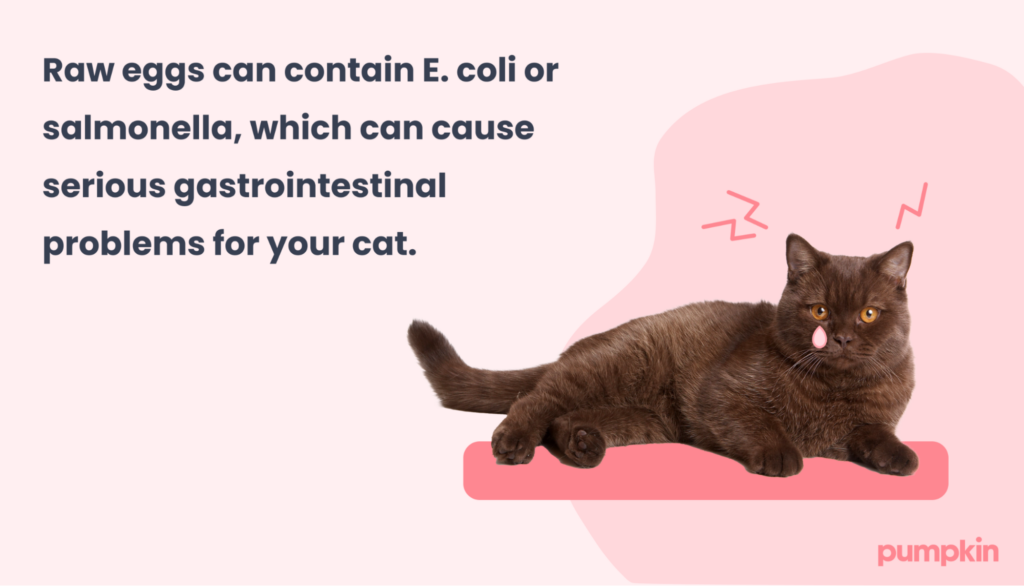Key Points:
- Yes, cats can eat cooked eggs in moderation.
- Cats gain health benefits from the amino acids, vitamins, and protein in eggs.
- Raw eggs can contain harmful bacteria and are not safe for cats to consume.
Even though cats tend to be picky eaters, eggs are one popular human superfood they seem to love, so it’s a good thing that cats can eat eggs safely.
Nutritious as they are, eggs come in many forms. Scrambled, boiled, over easy, or a la omelet with all your favorite fixings, like cheese, fresh herbs, and maybe a dollop of salsa.
Read on to find out what kinds of egg dishes are safe for your kitty and the potential health benefits (and risks) of feeding eggs to cats.
The health benefits of eggs for cats
Cats are obligate carnivores, which means they get all their nutrition from animal products. They have the enzymes needed to digest animal proteins, including the ones found in eggs.
Eggs are so good for cats that many cat breeders will add the occasional egg to their cats’ diets to give them shinier coats and keep their claws healthy. Cat food manufacturers also add eggs to their cat food and cat treat formulas to increase the protein percentages.
Eggs aren’t just a good source of protein (one large egg contains about 6 grams of protein); they also contain important amino acids, the building blocks of protein. Cats need 11 essential amino acids, and 10 of them are found in eggs. The vitamins in eggs support a healthy nervous system, strong bones, and smooth digestion, among many other benefits. In addition, the minerals found in eggs play a role in your cat’s health, boosting blood cell production, skin and coat health, and preventing cell damage.
Some of the nutrients found in eggs include:
- Vitamin A
- Vitamin D
- Vitamin E
- Vitamin B12
- Vitamin B1 (thiamine)
- Vitamin B2 (riboflavin)
- Vitamin H (biotin)
- Iron
- Zinc
- Selenium
The risks of feeding eggs to cats
Even though they’re jam-packed with nutrients, there are some health risks you should be aware of before feeding eggs to your kitty.
Cholesterol
Eggs have some fat and cholesterol in the yolks. Too much fat in a cat’s diet can cause pancreatitis or add to an obesity problem. Overweight cats and cats with kidney issues should not eat egg yolks. Even egg whites should only be an occasional treat.
Harmful bacteria

Cats shouldn’t eat raw eggs because they can carry E. coli or salmonella, which can cause serious gastrointestinal problems. Even cats who are fed raw diets shouldn’t be given raw eggs. Cooked eggs are always the safest way to share an egg with your cat.
Intolerance and allergies
Cats can also have food intolerances or allergies, but it’s not common for a cat to have an egg allergy. Even so, when feeding your cat any human food, it’s always a good practice to monitor them for signs of an allergic reaction like sneezing, excessive scratching, skin or ear infections, vomiting, or diarrhea.
How much egg can you feed your cat?
Even though eggs are packed with essential nutrients, treats like eggs should only make up 10% of your cat’s daily calories. As a rule of thumb, make eggs a snack only once or twice a week as part of their normal diet, and never give them a whole egg. As a rule of thumb, a few slices of a hard-boiled egg is enough for most cats.
If you want to make eggs part of your cat’s regular, everyday diet, then we recommend consulting with a board-certified veterinary nutritionist first. Together, you can formulate a complete and balanced diet for your cat.
How to feed eggs to your cat
The best way to feed eggs to your cat is by boiling, poaching, scrambling, or frying them with no butter or seasoning. Break the egg up into bite-sized pieces and offer a few small bites at a time. You can also mix boiled or scrambled eggs into your cat’s kibble or wet food.
The bottom line: Cats can have eggs
Cooked eggs offer a high nutritional value for cats, including shiny fur and healthy claws. Just be cautious about serving sizes and frequency to avoid any tummy or digestion problems.
You can also keep your cat healthy with regular vet visits, but it’s the unexpected trips to the vet that can be stressful, both for your kitty and your wallet. As your cat grows up, pet insurance can give you peace of mind when facing accidents and illnesses. Find out how Pumpkin pet insurance plans can help you give your cat best-in-class care in the future.
FAQs
- https://www.petmd.com/blogs/nutritionnuggets/cat/dr-coates/2014/march/what-makes-cats-carnivores-31467
- https://www.petfoodindustry.com/nutrition/pet-food-ingredients/article/15464397/egg-products-analyzed-by-variety-most-used-in-pet-food
- https://www.sciencedirect.com/science/article/abs/pii/027153179591652S
- https://fdc.nal.usda.gov/fdc-app.html#/food-details/173424/nutrients
- https://www.animalbiome.com/blog/vitamin-b12-deficiency-in-cats-the-role-of-the-gut
- https://nasc.cc/pet-university/vitamin-d-deficiency-cats/
- https://www.purina.com/articles/cat/health/skin-fur-ears/healthy-skin-and-coat
- https://vcahospitals.com/know-your-pet/pancreatitis-in-cats
- https://www.fda.gov/food/buy-store-serve-safe-food/what-you-need-know-about-egg-safety
- https://wsava.org/wp-content/uploads/2024/06/Feeding-treats-to-your-cat-v2.pdf




